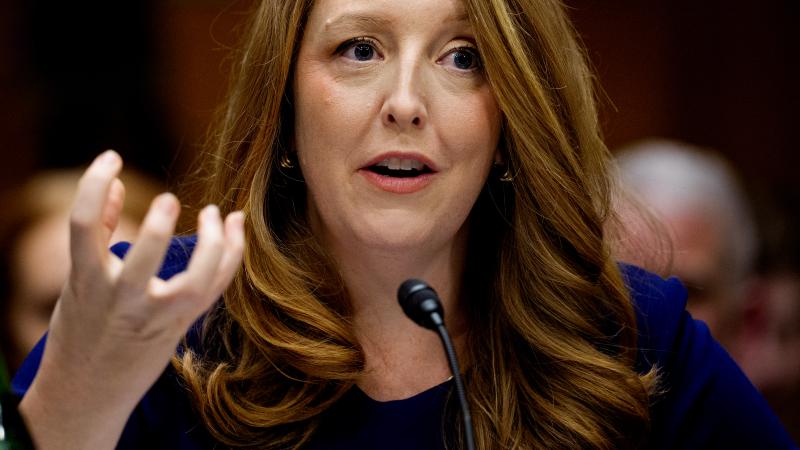Capitol violence marked by security breakdowns, witnesses tell senators in wide-ranging hearing
"This mob was like nothing I have seen in my law enforcement career" - former U.S. Capitol Police Chief Steve Sund.
The Jan. 6 breach on the U.S. Capitol was marked by intelligence breakdowns, senators said in concluding statements following a Tuesday hearing. Their comments came following an hours-long hearing in which former Capitol security officials testified about events related to the breach.
The much anticipated joint oversight hearing included testimony from former Senate Sergeant-at-Arms and Doorkeeper Michael Stenger; former House Sergeant-at-Arms Paul Irving; former U.S. Capitol Police Chief Steven Sund; and the acting chief of Washington, D.C.'s Metropolitan Police Department, Robert Contee.
"You can point fingers but can also look at this as a process that is not prepared for a crisis," Democratic Sen. Amy Klobuchar, chairwoman of the House Rules Committee, said at the conclusion of the roughly four-hour hearing.
Security at the Capitol should involve "better intelligence sharing," Klobuchar also said. "We'll get more details in the coming week," at a hearing with intelligence officials.
The date of that hearing will be announced on Wednesday.
Questioning at a hearing largely focused on the timing of when U.S. Capitol Police asked for National Guard support during the riot.
Security witnesses told senators that they were not complicit in the violence at the Capitol Building. The witnesses made their comments in response to questions about remarks to that effect from retired Lt. Gen. Russel Honore, who was appointed by House Speaker Nancy Pelosi to review the security posture surrounding the breach.
In the days following the violent breach, Honore – who established a reputation for managing the federal response to Hurricane Katrina – cast blame on Capitol Police and other security officials for being "complicit" in the riot.
"I found the statements he made regarding myself" and the police were highly disrespectful, former former Capitol Police Chief Steven Sund said.
Said Sengar: "Saying something like that is not in good taste."
Sen. Josh Hawley, R-Mo., affirmed statements from the witnesses who said they were not complicit in the violence.
Honore was "disrespectful" in suggesting otherwise, Hawley said, adding that the outspoken retired three-star general "has no business leading any security review of events of Jan. 6."
Other questions addressed the timing of when Capitol Police asked for National Guard for support.
Sund told senators that he waited four-and-a-half hours to receive help from the National Guard, after first asking the House and Senate sergeants at arms that the situation at the Capitol was dire.
"I notified the two Sergeant at Arms by 1:09 p.m. that I urgently needed support and asked them to declare a State of Emergency and authorize the National Guard," he said. "I was advised by Mr. Irving that he needed to run it up the chain of command. I continued to follow up with Mr. Irving, who was with Mr. Stenger at the time, and he advised that he was waiting to hear back from congressional leadership, but expected authorization at any moment."
Irving testified that he had no memory of a call from Sund at 1:09 p.m., prompting Sen. Rob Portman, R-Ohio, to say that the timing was important, and that both men should produce their phone records.
The hearing opened with ex-security and law enforcement officials saying the intelligence assessments they receive before the breech did not include warnings of an overwhelming, violent assault.
"The breach of the United States Capitol was not the result of poor planning or failure to contain a demonstration gone wrong," Sund told senators. Based on intelligence, law enforcement officials expected protests similar to other events at the Capitol and Supreme Court, and prepared accordingly.
"The USCP implemented a number of enhancements to our planning for January 6, 2021, based on the intelligence that we had," he also said.
The former chief described officers' shock at encountering a violent confrontation.
"This mob was like nothing I have seen in my law enforcement career," Sund said. "The group consisted of thousands of well-coordinated, well-equipped violent criminals. They had weapons, chemical munitions, protective equipment, explosives, and climbing gear."
Stenger echoed the comments about intelligence assessments.
"We all believed the plan met the threat," he said. "We all know we had the wrong plan."
"Like Chief Sund, based on the intelligence and the extensive deployment of law enforcement resources, I erroneously believed that we were prepared," Irving said in prepared testimony.
He also said in prepared remarks: "Certain media reports have stated that 'optics' determined my judgement about using those National Guard troops.
"That is categorically false. 'Optics' as portrayed in the media did not determine our security posture; safety was always paramount when evaluating security for January 6. We did discuss whether the intelligence warranted having troops at the Capitol, and our collective judgment at that time was no – the intelligence did not warrant that."















